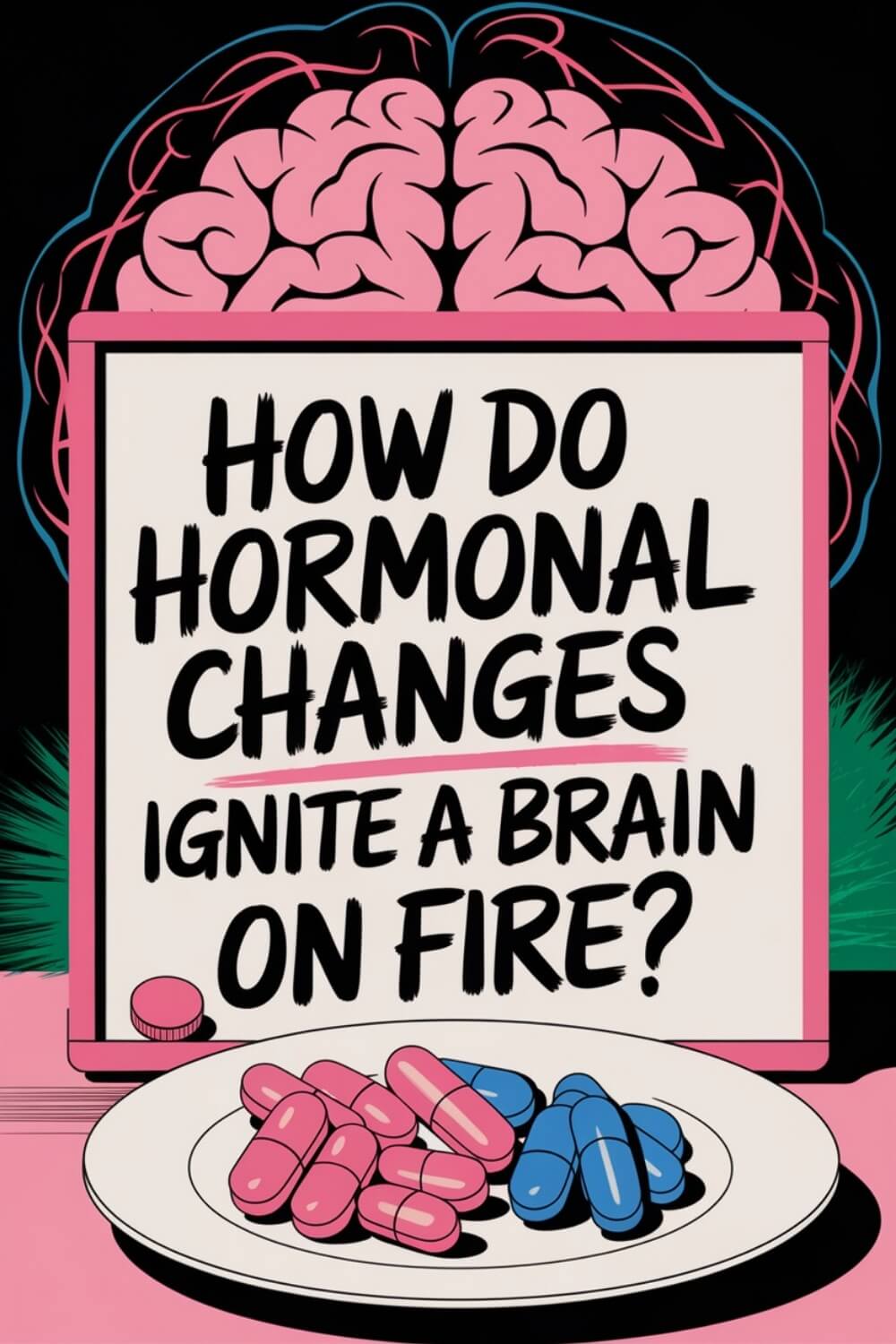How Do Hormonal Changes Ignite a Brain on Fire?
Did you know that postmenopausal women see a big drop in brain matter? This includes gray matter volume, connectivity, and energy use. This shows how hormonal changes can deeply affect the female brain during menopause, furthermore, hormonal changes ignite a brain on fire!
As women get closer to menopause, the drop in estrogen and progesterone levels starts. This can lead to mood swings, brain fog, anxiety, memory problems, sleep issues, and hot flashes. These changes can make a woman’s brain feel like it’s on fire, causing inflammation, disrupted neurotransmitters, and cognitive problems.
It’s important to understand how hormones and brain health are connected for women going through menopause. In the next parts, we’ll explore the science behind these changes. We’ll also look at how they affect the brain and what women can do to lessen the “brain on fire” effects.
- Understanding Neurohormones and Their Impact
- Estrogen's Pivotal Role in Brain Health
- Progesterone: The Relaxation Hormone
- Hormonal Changes Brain on Fire: Manifestations
- Perimenopause and Menopause: Catalysts for Brain Fog
- Hormonal Imbalances and Brain Structure
- Decreased Blood Flow to the Brain
- Tiny Brain Lesions: A Menopause Aftermath
- Alzheimer's Disease and Hormonal Changes
- Treating Menopause-Related Brain Changes
- The Role of Thyroid Hormones in Brain Fog
- Women's Hormone Clinics: Restoring Mental Clarity
- Source Links to How Do Hormonal Changes Ignite a Brain on Fire
Understanding Neurohormones and Their Impact
Hormones are powerful chemical messengers that connect the brain and body. They are made by glands and organs and control many functions. When they’re balanced, we feel good, energetic, and sharp.
But, if they’re not, it can cause problems. This can lead to brain and mental health issues.
Hormones as Chemical Messengers
The human body has over 100 known neurotransmitters. Each one has its own role in our brain and body. For example, glutamate helps us think, and GABA helps us relax.
Imbalances in these messengers can cause issues. This includes depression, anxiety, and even Alzheimer’s disease.
Balanced Neurohormones for Optimal Brain Function
Keeping neurohormones in balance is key for a healthy brain. When they’re not, we might feel tired, forgetful, or mentally drained. It’s important to understand how the brain and hormones work together.
The study of neuroendocrinology started in the late 1950s. Pioneers like Geoffrey Harris and Jacobsohn showed us how important neurohormones are. They help us see how they shape our brain-body connection.
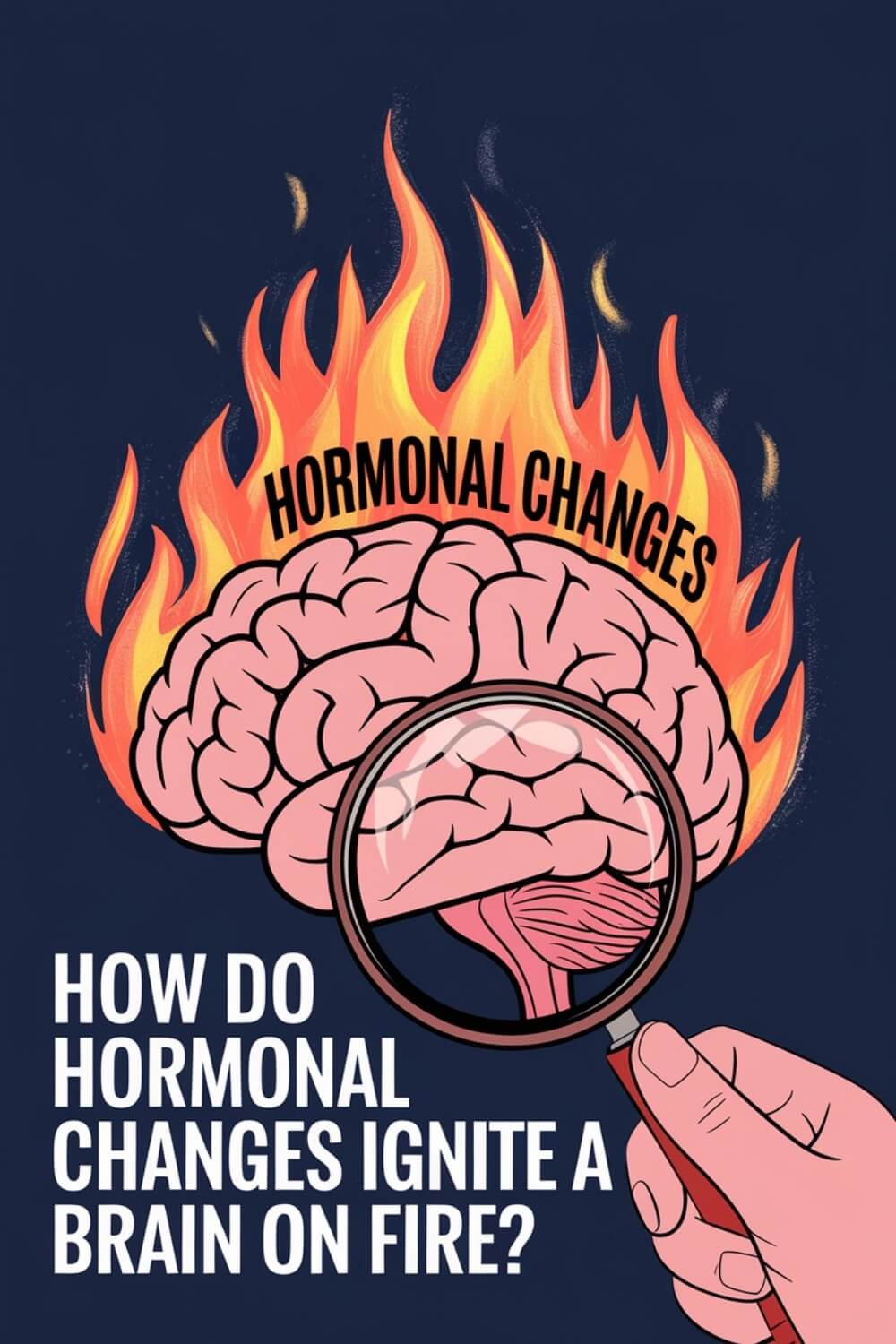
Estrogen’s Pivotal Role in Brain Health
The female brain has many estrogen receptors. These are found in parts of the brain linked to mood, memory, body temperature, and sleep. Estrogen is a key hormone that helps the brain work well. It comes in three types: estrone, estradiol, and estriol.
When estrogen levels are right, it helps us feel good, remember things well, stay comfortable, and sleep well. But, when estrogen drops a lot, like during menopause, it can cause brain problems.
Estrogen Receptors in the Female Brain
The female brain has lots of estrogen receptors. These are in areas important for thinking, feeling, and brain health. Estrogen helps control many brain functions, like mood, memory, and body temperature.
Types of Estrogen and Their Functions
There are three main types of estrogen: estrone, estradiol, and estriol. Each type has a special role in brain health. Estradiol (E2) is the most active and helps protect the brain and improve thinking.
Estrone (E1) is the main estrogen after menopause. Estriol (E3) is the weakest and is made mostly during pregnancy. When these estrogens are balanced, they help us feel good, remember well, stay comfortable, and sleep well.
The research shows how important estrogen is for brain health. It helps us understand how hormonal changes affect our brains. This knowledge helps us see how these changes impact our thinking and feelings.
| Estrogen Type | Primary Function |
|---|---|
| Estradiol (E2) | Neuroprotection, Cognitive Enhancement |
| Estrone (E1) | Predominant Estrogen during and after Menopause |
| Estriol (E3) | Weakest of the Three, Primarily Produced during Pregnancy |
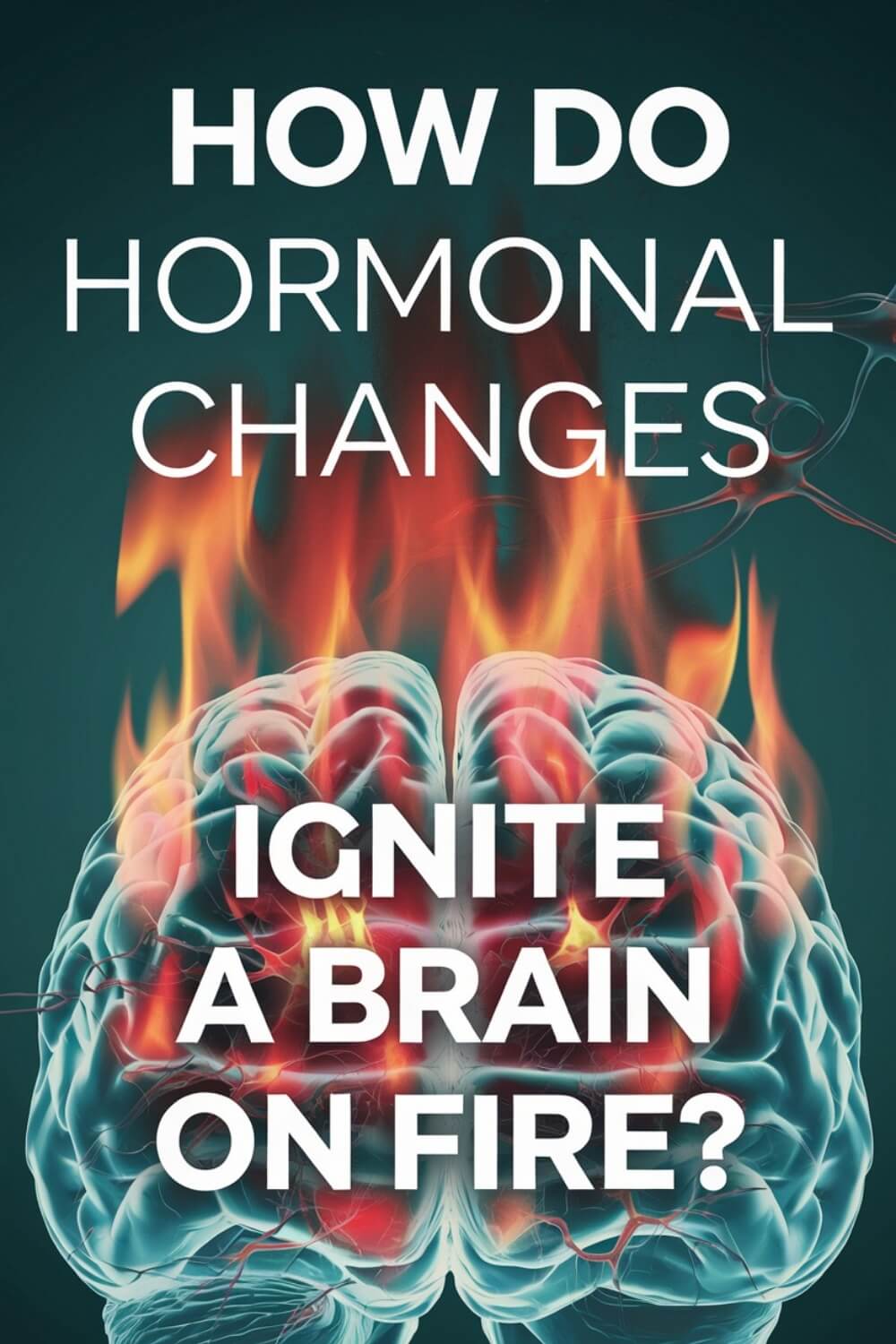
Progesterone: The Relaxation Hormone
Progesterone is a key hormone in the female body, with many receptors in the brain. It’s known as the “relaxation hormone” because it calms the brain and promotes sleep. It also has neuroprotective effects, reducing inflammation and protecting the brain from injury.
When women go through perimenopause and menopause, their progesterone levels drop. This can cause irritability, anxiety, depression, sleep problems, and brain fog. The decrease in progesterone affects a woman’s thinking and mood.
Progesterone works by interacting with GABA receptors in the brain. This boosts GABA’s calming effects. It also fights inflammation, protecting brain cells.
Progesterone helps grow and repair nerve cells, keeping the brain sharp. Studies show it’s key for brain health, affecting behaviors like exploration and social interaction.
Keeping progesterone levels healthy is vital for women, as they transition to menopause. Using bioidentical hormone replacement therapy can help manage menopause symptoms and support brain health.
Hormonal Changes Brain on Fire: Manifestations
Hormonal imbalances can mess up the brain’s chemistry. This leads to diminished focus and concentration. It makes it hard to work well and finish tasks.
This change also makes it tough to stay mentally sharp. It feels like you’re not fully there, leading to less productivity.
Memory lapses and forgetfulness are common too. Hormones like estrogen and testosterone play a big role in memory. When they change, remembering new things and recalling old ones can be hard.
Mental Exhaustion and Fatigue
Feeling mentally exhausted and fatigued is a big problem. It’s hard to stay alert and sharp when hormones are changing. Even simple tasks can feel too much.
Knowing about cognitive symptoms from hormonal changes is key. It helps understand brain fog better. By recognizing how hormones affect focus, memory, and energy, we can fight these issues. This way, we can stay sharp during perimenopause and menopause.
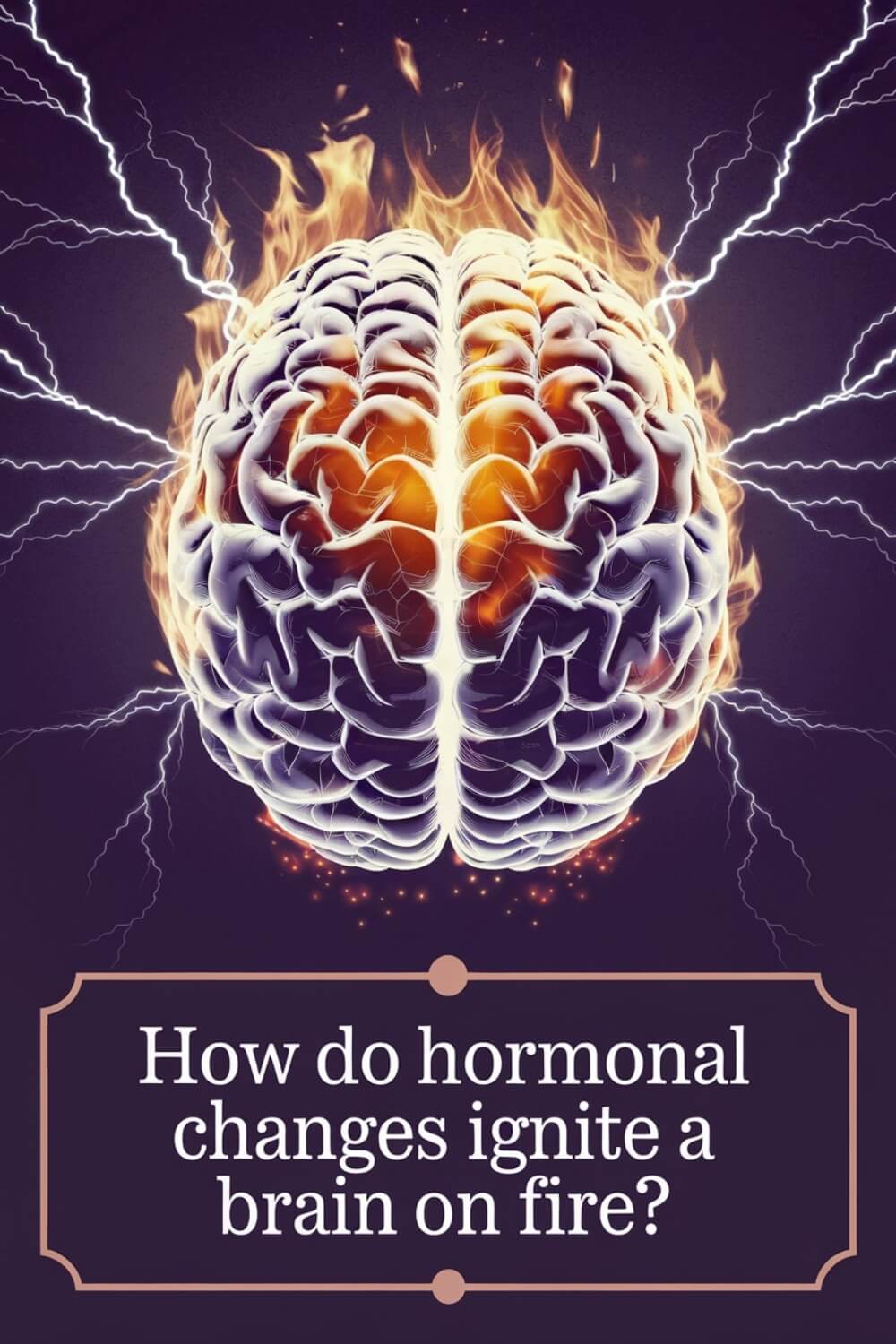
Perimenopause and Menopause: Catalysts for Brain Fog
The hormonal changes during perimenopause and menopause can affect the brain a lot. They can cause mood swings, anxiety, memory loss, sleep issues, and trouble regulating body temperature. Changes in estrogen levels can lead to brain problems. The drop in progesterone can make people feel irritable, anxious, depressed, and foggy.
Estrogen Fluctuations and Cognitive Impact
As women get closer to menopause, their estrogen levels start to swing. This can cause brain and thinking problems. The brain’s usual work gets disrupted, making it hard to focus, concentrate, and remember things.
Progesterone Decline and Its Effects
The drop in progesterone levels also plays a part in brain fog. Progesterone helps us relax. Without enough, we might feel more irritable, anxious, and depressed. This can make thinking harder.
The mix of hormonal changes in perimenopause and menopause can really mess with a woman’s mind. It can make her feel lost, forgetful, and mentally drained. Knowing about these changes helps women deal with these issues and stay sharp.
Hormonal Imbalances and Brain Structure
Endocrine disrupting chemicals in everyday products can greatly affect our hormonal balance. This balance is key for our brain health. Research has shown a strong link between hormonal imbalances and brain changes during menopause.
Reductions in Gray Matter Volume and Connectivity
A 2021 study found that menopause brings big changes to the brain. These include less gray matter, reduced connections, and changes in energy use. These changes can lead to symptoms like cognitive issues and neurological problems.
Studies also show that postmenopausal women have less brain volume than pre-menopausal women and men of the same age. These changes affect how well our brains work and our overall health.
Hormonal imbalances lead to brain changes that cause symptoms in women during menopause. It’s vital to understand and tackle these issues.
| Measure | Findings |
|---|---|
| Gray Matter Volume | Decreases during the menopausal transition |
| Brain Connectivity | Reductions in neural network connectivity observed |
| Energy Metabolism | Alterations in brain energy utilization patterns |
Decreased Blood Flow to the Brain
When estrogen levels decline, there’s less cerebral blood flow. This drop in blood to the brain is linked to cognitive impairment. It can cause depression, anxiety disorders, insomnia, weight gain, and brain fog.
Less blood to the brain affects brain health and function. During perimenopause and menopause, estrogen levels drop sharply. This disrupts the brain’s blood system, leading to various mental and neurological issues.
Keeping cerebral blood flow healthy is key for brain function and well-being. Tackling hormonal changes that lead to less blood flow is vital. It helps manage the mental and cognitive challenges of estrogen decline.
| Condition | Impact on Cerebral Blood Flow |
|---|---|
| Depression | Reduced blood flow to the prefrontal cortex and other brain regions associated with mood regulation |
| Anxiety | Decreased blood flow to the amygdala and other areas involved in processing emotional responses |
| Cognitive Impairment | Diminished blood supply to the hippocampus and frontal lobes, leading to memory and concentration issues |
Tiny Brain Lesions: A Menopause Aftermath
Research shows that menopause can change the brain’s structure and function. A study found that hot flashes, like night sweats, are linked to more white matter hyperintensities. These tiny brain lesions are a concern because they raise the risk of cognitive decline, stroke, and other neurological symptoms.
The 2022 study highlights the link between hormonal changes and brain health in menopause. It shows how important it is to keep the brain working well during this time. The presence of these lesions could signal future brain challenges due to menopause’s hormonal shifts.
Healthcare providers can now better monitor and manage brain health in midlife women. This knowledge helps women work with their doctors to address hormonal imbalances. It also supports cognitive function and overall brain health during this critical time.
This study calls for more research into the relationship between hormones, brain structure, and thinking abilities. As we learn more about aging brains, we need a holistic approach for women in menopause. This approach will help preserve brain health and support successful aging.
Read more about the impact of hormonal changes on neurodegenerative.
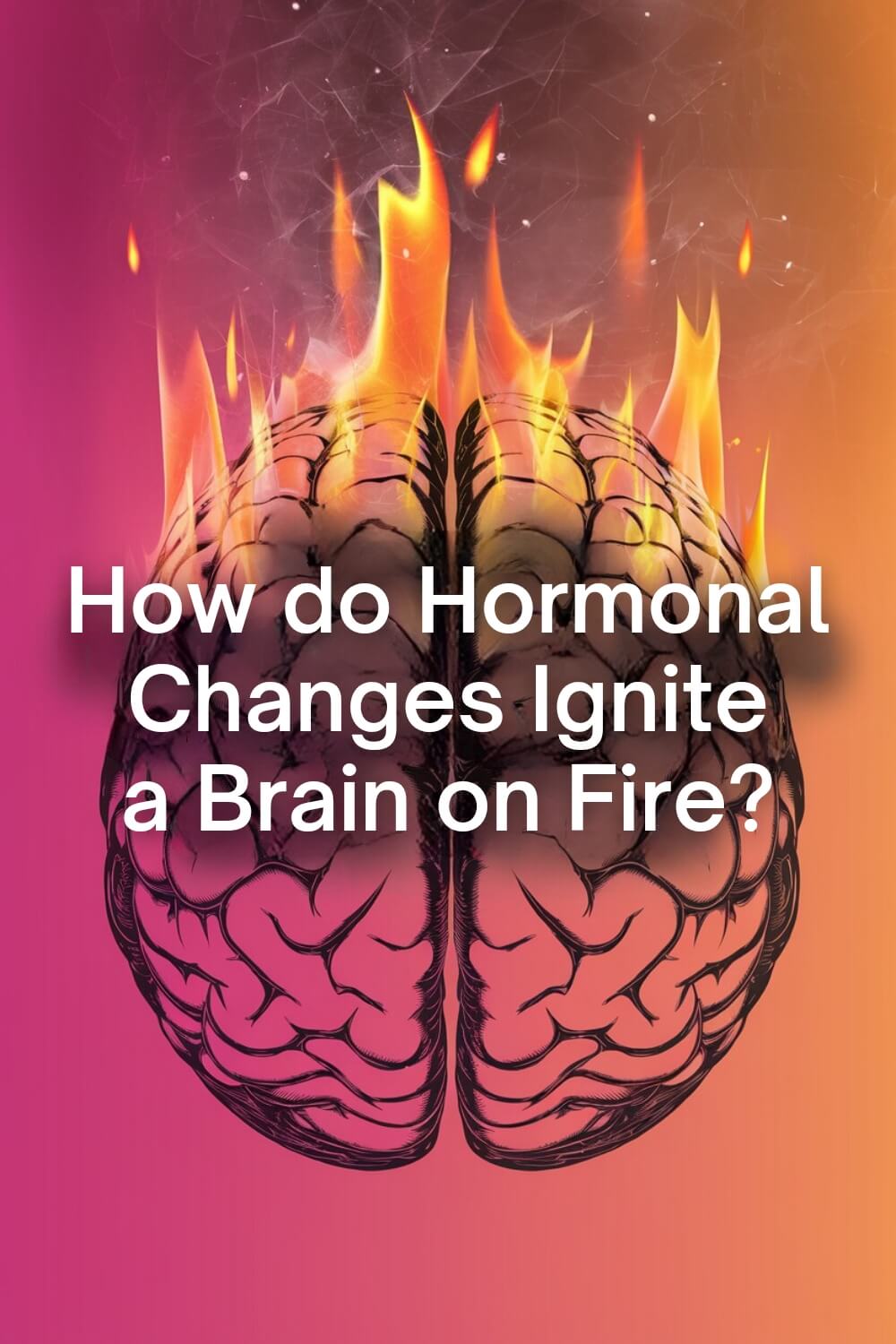
Alzheimer’s Disease and Hormonal Changes
Women going through menopause face big changes in their brain health. The drop in estrogen levels can link to a higher risk of Alzheimer’s disease. This is a new area of research.
A 2024 study in the Journal of Alzheimer’s Disease found something interesting. It shows that hot flashes at night might raise the risk of Alzheimer’s. This is true for women who are genetically more likely to get the disease.
| Statistic | Value |
|---|---|
| Percentage of people aged 85 diagnosed with dementia | 30% |
| Decrease in brain speed for women who had a hysterectomy and ovaries removed before menopause | 15% |
| Increased risk of cognitive impairment for women with very high blood pressure | 30% |
The study shows how important hormones are for brain health. As women go through menopause, it’s key to watch their brain health. They should look into ways to protect their brain from hormonal changes.
Researchers hope to help doctors give better care to women during menopause. They want to support women’s brain health during this important time.
Treating Menopause-Related Brain Changes
Women going through menopause face brain changes that need attention. Luckily, there are ways to handle these changes and keep the brain healthy. These strategies are key during this important time in life.
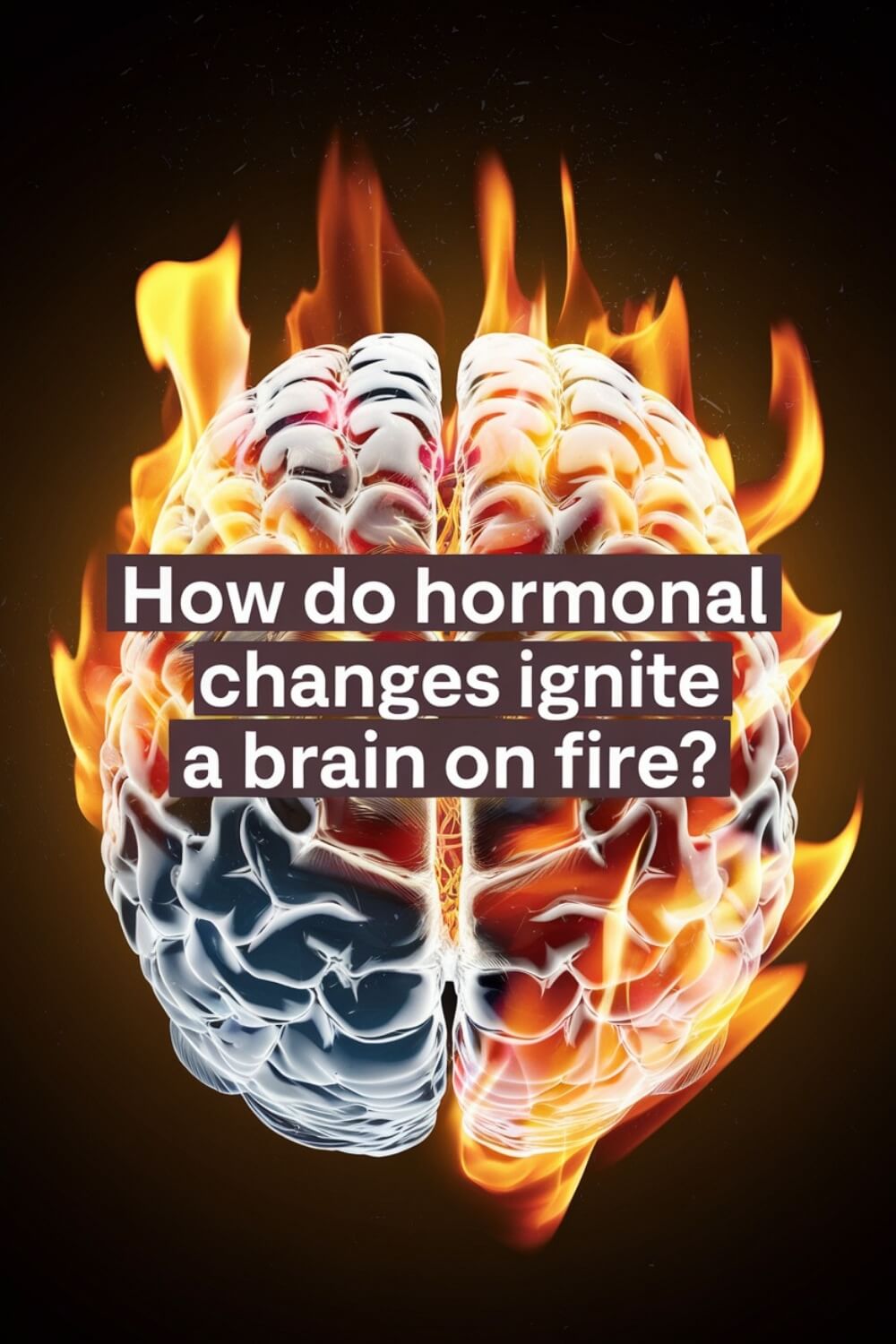
Bioidentical Hormone Replacement Therapy (BHRT)
Bioidentical hormone replacement therapy (BHRT) is a promising solution. It helps with brain fog and memory loss by balancing hormones. This therapy can make a big difference in how women feel mentally.
Exercise and Stress Reduction Strategies
Regular exercise and stress management are also vital. Exercise boosts blood flow to the brain. Stress-reducing activities like meditation and yoga help too. They counteract the effects of hormonal shifts on the mind.
Sleep Hygiene and Healthy Brain Foods
Good sleep and a nutrient-dense diet are essential. Foods like fatty fish and berries support brain health. Keeping a healthy sleep routine and eating right can help with memory and focus.
Combining BHRT, exercise, stress management, quality sleep, and a brain-healthy diet helps. Women can manage menopause-related brain changes and keep their minds sharp. This approach is effective during this critical life stage.
The Role of Thyroid Hormones in Brain Fog
The thyroid gland is key in controlling metabolism, energy, and brain work. But, problems with thyroid hormones can lead to brain fog. This makes it hard to focus, remember things, and feel mentally tired.
Studies show that hypothyroidism affects 4.6% of people in the U.S., and hyperthyroidism impacts 1.3%. For postmenopausal women, 1 in 4 might have thyroid issues. This is worrying because the thyroid’s function drops by 40% from age 30 to 80 in these women, leading to cognitive problems.
Getting help from a women’s hormone clinic can really help with thyroid-related brain fog. These clinics find and fix thyroid imbalances that cause brain fog. This way, people can get their mental sharpness back and feel better overall.
Thyroid imbalances can come from many things like too much stress, not enough nutrients, long-term illnesses, and some medicines. Finding and fixing the main cause is key to beating brain fog and its symptoms.
In short, thyroid hormones are vital for a healthy brain. When they’re off, it can cause brain fog. Getting the right care and fixing the problem can help people regain their mental clarity and sharpness.
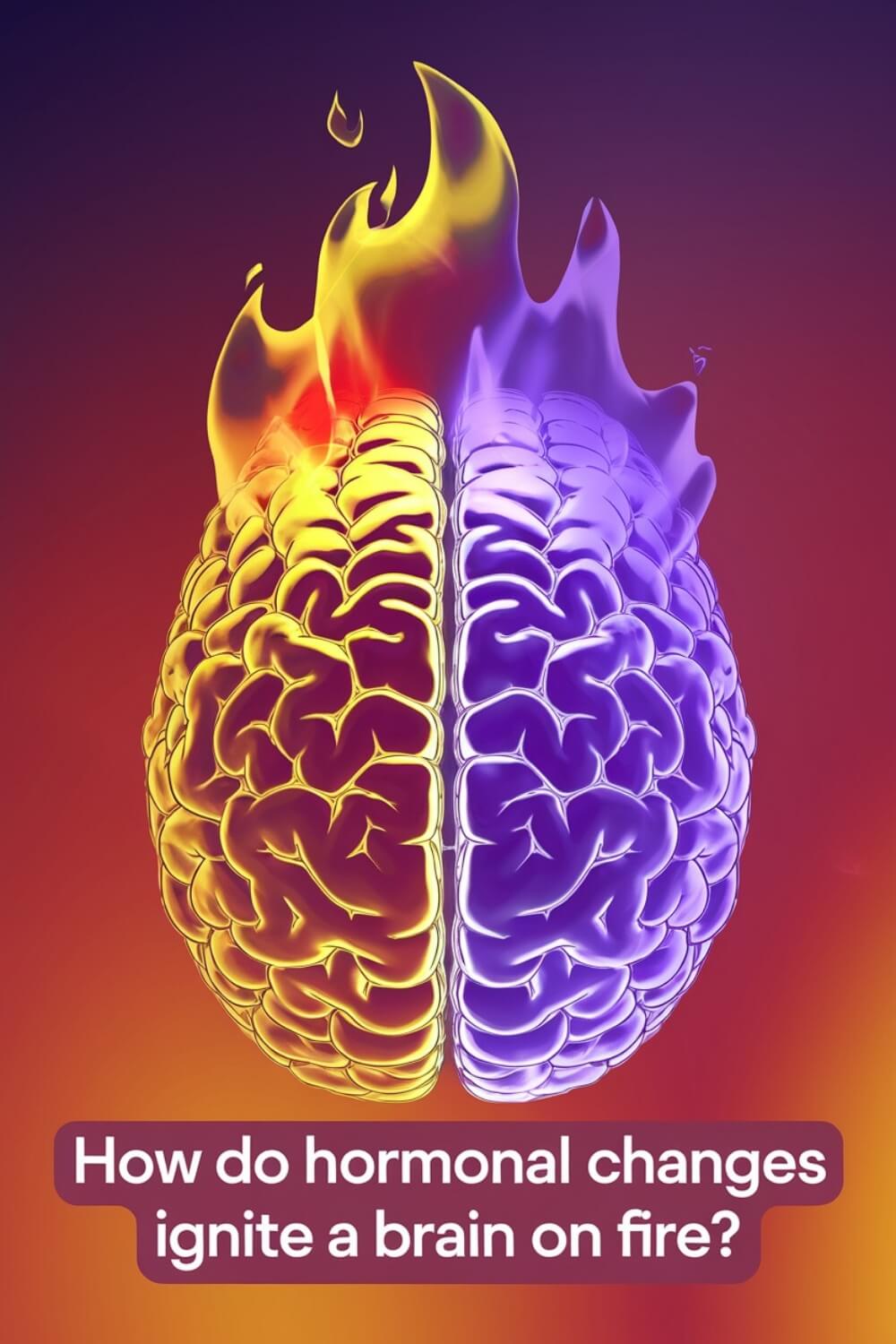
Women’s Hormone Clinics: Restoring Mental Clarity
Women facing brain fog and cognitive issues due to hormonal imbalances can find relief at women’s hormone clinics. These clinics focus on finding and fixing hormonal problems. They offer personalized hormone therapy to help women regain their mental sharpness.
Experts at these clinics use detailed tests and assessments to create custom hormone treatments. They help women dealing with perimenopause, menopause, or other hormonal issues. Each patient gets a plan that meets their specific needs.
Personalized hormone therapy can greatly improve memory, focus, and mental health. By balancing hormones like estrogen and testosterone, women can boost their mental clarity. This approach helps women feel more focused, happy, and full of energy.


About Me
Hi, I’m Lucjan! The reason why I decided to create this blog was my beautiful wife, who experienced a lot of pain in life, but also the lack of information about endometriosis and fibromyalgia for men…
Source Links to How Do Hormonal Changes Ignite a Brain on Fire
- https://www.amenclinics.com/blog/5-ways-menopause-can-change-your-brain-health/
- https://www.broadwayclinic.com/article/decoding-the-link-between-hormones-and-brain-fog
- https://www.litcharts.com/lit/brain-on-fire-my-month-of-madness/chapter-3
- https://my.clevelandclinic.org/health/articles/22513-neurotransmitters
- https://www.medicalnewstoday.com/articles/326649
- https://www.ncbi.nlm.nih.gov/pmc/articles/PMC6240150/
- https://www.mdpi.com/1422-0067/22/1/373
- https://www.ncbi.nlm.nih.gov/pmc/articles/PMC1778460/
- https://www.mdpi.com/1422-0067/21/15/5271
- https://www.sklarcenter.com/blog/preventing-dementia-hormones-brain-health/
- https://www.ncbi.nlm.nih.gov/pmc/articles/PMC10747486/
- https://www.linkedin.com/pulse/your-brain-fire-elizabeth-lyster
- https://healthmatters.nyp.org/how-to-protect-your-brain-health-during-menopause/
- https://www.holisticcharlotte.com/is-your-brain-on-fire-symptoms-of-brain-inflammation-2/
- https://www.mdpi.com/2072-6643/14/9/1982
- https://scholarlykitchen.sspnet.org/2024/04/29/mental-health-awareness-mondays-the-menopausal-effect-on-the-workforce/
- https://www.niehs.nih.gov/health/topics/agents/endocrine
- https://www.news-medical.net/health/How-Does-Menopause-Affect-the-Brain.aspx
- https://www.ncbi.nlm.nih.gov/pmc/articles/PMC3181836/
- https://www.ncbi.nlm.nih.gov/pmc/articles/PMC9972189/
- https://www.scientificamerican.com/article/blood-flow-may-be-key-player/
- https://www.mdpi.com/1422-0067/24/7/6566
- https://www.frontiersin.org/journals/neuroscience/articles/10.3389/fnins.2020.625397/full
- https://sklarcenter.com/blog/preventing-dementia-hormones-brain-health/
- https://www.theguardian.com/society/2021/oct/10/menopause-brain-the-inability-to-think-clearly-is-not-all-in-your-mind
- https://magazine.hms.harvard.edu/articles/mental-health-aspects-menopause
- https://www.mdpi.com/2673-396X/2/4/36
- https://www.additudemag.com/menopause-perimenopause-adhd-research/
- https://www.amenclinics.com/blog/thyroid-balance-your-key-to-brain-body-harmony/
- https://www.thyroid.org/patient-thyroid-information/ct-for-patients/may-2022/vol-15-issue-5-p-3-4/
- https://thecarrollinstitute.com/brain/the-five-root-causes-of-brain-fog
- https://www.mdpi.com/2673-4184/3/3/33
- https://www.drdubrow.com/wellness-medicine/
- https://www.ncbi.nlm.nih.gov/pmc/articles/PMC7597864/
